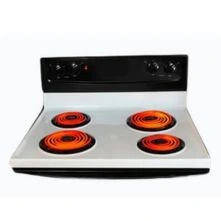Get A Quote
BIS Certification for Electric Stoves– IS 302 (Part 2 /Sec 202)

Electric
stoves are popular cooking appliances in households, designed for efficient and
controlled cooking with an integrated electric heating element. Due to their
contact with high temperatures and potential exposure to moisture, these
appliances must comply with stringent safety standards to prevent electrical
hazards, overheating, and structural issues. BIS certification under IS 302
(Part 2/Sec 202) mandates that electric stoves meet safety and performance
guidelines, ensuring reliable and secure usage in everyday kitchen
environments.
Introduction
The
Bureau of Indian Standards (BIS) mandates certification for electric stoves
under IS 302 (Part 2/Sec 202), a standard focused on ensuring safety for
household cooking appliances. This standard specifies requirements to mitigate
risks associated with electric stoves, including shock hazards, overheating,
and durability concerns. Manufacturers must obtain BIS certification, signified
by the ISI mark, to market electric stoves legally in India, ensuring that
products conform to national safety standards.
Why is BIS Certification Necessary for Electric
Stoves?
BIS certification is crucial for electric stoves, as it upholds essential safety and quality standards to protect users from electrical and overheating risks. By complying with IS 302 (Part 2/Sec 202), electric stoves meet mandatory parameters for insulation, temperature regulation, and structural integrity, assuring consumers of their durability and safe performance. BIS certification reinforces consumer confidence in the product's quality and adherence to Indian safety standards, making it a key requirement for manufacturers.
Overview of Indian Standard IS 302 (Part 2/Sec 202)
Indian Standard IS 302 (Part 2/Sec 202) outlines essential safety requirements for electric stoves to ensure safe usage. These include electrical insulation to prevent shocks, particularly in moisture-prone areas, and overheating protection mechanisms to reduce the risk of burns and fire. The standard mandates the use of heat-resistant and durable materials for components, ensuring the stove can withstand high temperatures and frequent use. It also requires the stove to maintain stable performance by providing consistent heating without sudden fluctuations, ensuring efficient cooking. Additionally, high-quality heating elements are specified to ensure durability and longevity, even after repeated heating cycles, further enhancing safety and reliability. These standards help deliver safe, reliable, and durable electric stoves for everyday use.
Process for BIS Certification
To obtain
BIS certification for electric stoves under IS 302 (Part 2/Sec 202),
manufacturers must follow these steps:
- Application Submission: Submit an application along
with necessary documents, including product specifications and technical
details.
- Document Review: BIS reviews the application
and submitted documents to ensure compliance with the IS 302 (Part 2/Sec
202) standard.
- Factory Inspection: BIS officials conduct an
inspection to assess manufacturing processes and ensure quality control.
- Sample Testing: Samples are tested in
BIS-approved labs to verify adherence to the IS 302 (Part 2/Sec 202)
safety requirements.
- Certification Grant: Upon successful inspection
and testing, BIS grants certification, authorizing the manufacturer to
display the ISI mark on their electric stoves.
Documents Required for BIS Certification
Manufacturers
applying for BIS certification for electric stoves need to submit the
following:
- Application form
- Product specifications and
technical details
- Quality control and manufacturing
process documentation
- Test reports from
BIS-approved laboratories
- Factory layout and equipment
details
- Proof of business
registration
- Declaration of conformity to
IS 302 (Part 2/Sec 202) standards
These documents provide proof of compliance with the BIS requirements and safety standards necessary for electric stoves.
BIS ISI Mark Certification Costing And Timeline
To Know The Process in Detail, Please Visit:
- BIS ISI Mark Certification for Domestic Manufactures
- BIS ISI Mark Certification for Foreign Manufactures
Under BIS Registration Products ISI and CRS
Conclusion
BIS
certification under IS 302 (Part 2/Sec 202) is essential for electric stoves,
ensuring they meet safety standards for reliable performance in household
settings. Certification provides consumers with confidence in the product’s
safety, while manufacturers benefit from market legitimacy. EVTL India offers
expert consultancy to streamline the BIS certification process, guiding
manufacturers through application, testing, and compliance procedures to
achieve a smooth and successful certification experience. By partnering with
EVTL India, manufacturers ensure their products adhere to BIS standards,
achieving market readiness efficiently and effectively.
Free Call Back
Latest News & Update
📅 BIS Critical Component List (CCL) Updates for Solar PV Modules
🕒 BIS Fee Concessions for MSMEs and Startups | EVTL India
📅 Guidelines for Implementation of Essential Requirements for Security of CCTV
🕒 Omnibus Technical Regulation (OTR) Amendment Order, 2025
🕒 Extension of Timeline for Filing Annual Returns by Battery Producers
📅 Extension of Timeline for Filing Quarterly and Annual Returns for E-Waste
🕒 Extension of Concurrent Running Period for IS 302-1: 2008 and IS 302 (Part 1): 2024
🕒 BIS Guidelines for Grant of Licence (GoL) | EVTL India
📅 CPCB Guidance on filing of Application, Fees and more
🕒 CPCB Notification on Labelling of Plastic Packaging
📅 Mandatory Compliance for Input Materials of Steel and Steel Products for Imports
🕒 BIS Guidelines for Scheme-X Certification for OTR-Regulated Products
📅 BIS Upgrades Product Certification License Numbers to 10-Digit Series
🕒 BIS Certification No Longer Mandatory for 14 Chemical & Polymer Categories
Why Choose EVTL INDIA
Expertise in Indian Regulatory Standards
End-to-End Support
Trusted by Top Indian & Global Brands
Fast Processing & Transparent Pricing
Strong Liaison with Indian Authorities
Company Profile














